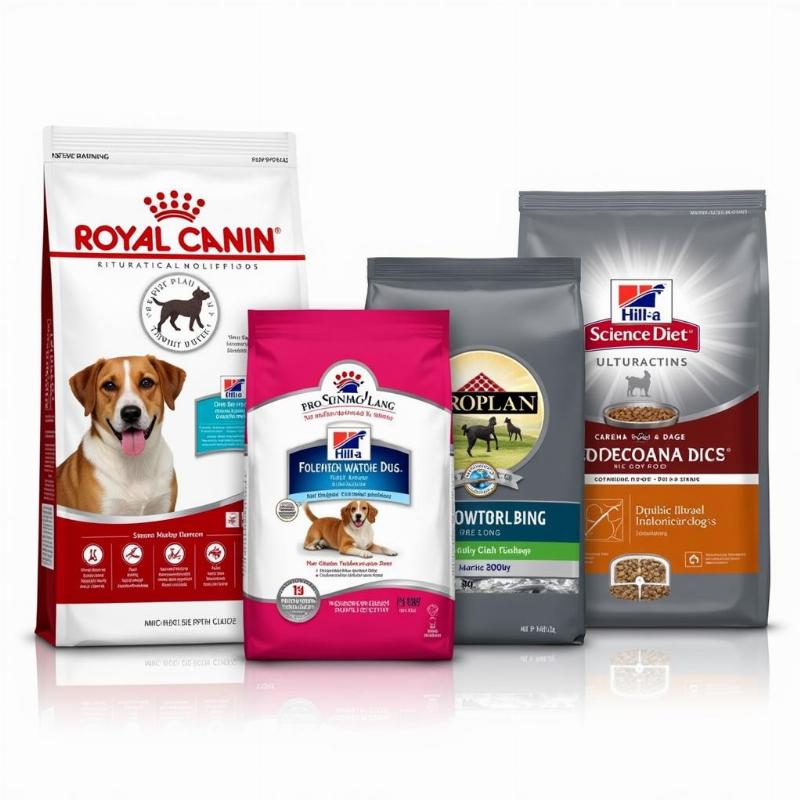Choosing the right food for your small breed companion can feel overwhelming with so many options available. Understanding their specific nutritional needs is key to ensuring they live a long, healthy, and happy life. This guide will help you navigate the world of small dog food and make the best choice for your furry friend.
Nutritional Needs of Small Breeds
Small dogs have unique dietary requirements due to their faster metabolisms and higher energy levels. They burn calories quicker than larger breeds and need a nutrient-dense diet to keep up. This means their food should be packed with protein for muscle maintenance, healthy fats for energy, and essential vitamins and minerals for overall well-being.
Protein Powerhouse
Protein is essential for building and repairing tissues, and small dogs need a higher protein percentage in their diet than larger breeds. Look for foods with high-quality animal protein sources like chicken, lamb, fish, or beef.
Fat for Fuel
Healthy fats provide sustained energy for your small dog’s active lifestyle. Sources like fish oil and flaxseed oil also contribute to healthy skin and a shiny coat. Avoid foods with excessive or unhealthy fats, which can lead to weight gain and other health problems.
Vitamins and Minerals for Vitality
A balanced blend of vitamins and minerals supports your small dog’s immune system, bone health, and overall function. Look for foods fortified with essential nutrients like calcium, phosphorus, and vitamins A, C, and E.
Dry, Wet, or Raw? Choosing the Right Food Type
The best type of food for your small dog depends on their individual needs and preferences. Each type has its pros and cons.
Dry Kibble: Convenient and Cost-Effective
Dry kibble is a popular choice due to its affordability and ease of storage. The small kibble size is perfect for small mouths and jaws. It also helps promote dental health by scraping away plaque and tartar.
Wet Food: Palatable and Hydrating
Wet food is a great option for picky eaters or dogs who need extra hydration. Its higher moisture content can benefit dogs prone to urinary tract infections. However, it’s generally more expensive than dry kibble and doesn’t offer the same dental benefits.
Raw Food: A Natural Approach
Raw food diets consist of uncooked meat, bones, fruits, and vegetables. While proponents claim it’s closer to a dog’s ancestral diet, it’s crucial to consult with your veterinarian before switching to a raw food diet. There are potential risks associated with bacterial contamination and nutritional imbalances if not prepared correctly.
Reading Dog Food Labels: What to Look For
Understanding dog food labels is crucial in making an informed decision. Don’t be fooled by marketing hype. Focus on the ingredient list and guaranteed analysis. Look for:
- AAFCO Statement: Ensure the food meets the Association of American Feed Control Officials (AAFCO) standards for complete and balanced nutrition.
- Ingredient List: The first few ingredients should be high-quality animal protein sources. Avoid fillers like corn, wheat, and soy.
- Guaranteed Analysis: Check the percentages of protein, fat, and fiber. Small breeds generally require higher protein and fat content.
- Life Stage: Choose a food formulated for your dog’s life stage (puppy, adult, or senior).
Top Dog Food Brands for Small Breeds
While the “best” dog food varies based on individual needs, several reputable brands consistently deliver high-quality nutrition for small breeds. Some popular options include Royal Canin, Hill’s Science Diet, and Purina Pro Plan.  Various dog food brands available in the US market
Various dog food brands available in the US market
Conclusion
Selecting the right food for your small dog is an important decision that impacts their overall health and well-being. By considering their specific nutritional needs, understanding food labels, and consulting with your veterinarian, you can provide your furry friend with the nourishment they need to thrive. Remember, a healthy diet is a cornerstone of a happy and vibrant life for your small dog companion.
FAQ
- How often should I feed my small dog? Small dogs benefit from frequent, smaller meals throughout the day due to their fast metabolisms. Two to three meals per day is usually recommended.
- What are some signs of food allergies in small dogs? Common signs include itchy skin, digestive upset, and ear infections.
- Can I give my small dog human food? While some human foods are safe for dogs, many are toxic. Always consult your veterinarian before giving your dog any human food.
- How do I transition my small dog to a new food? Gradually introduce the new food over several days, mixing it with their current food to avoid digestive upset.
- Is it okay to give my small dog treats? Treats are fine in moderation, but ensure they are specifically formulated for small dogs and don’t exceed 10% of their daily caloric intake.
- What should I do if my small dog is a picky eater? Try different flavors and textures of food, or consult with your veterinarian for advice.
- How much food should I give my small dog? Follow the feeding guidelines on the dog food label and adjust as needed based on your dog’s weight and activity level.
Beautdogs.us: Your Trusted Source for Dog Care Information
Beautdogs.us is your one-stop destination for comprehensive and engaging information on all aspects of dog care, breed-specific advice, and top-quality product recommendations. Whether you’re a new dog owner or a seasoned expert, Beautdogs.us provides authoritative, accessible content to help you navigate the joys and challenges of dog ownership. Contact us today for expert advice and personalized support! Email: [email protected], Phone: +1 501-555-7529.